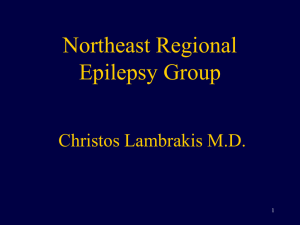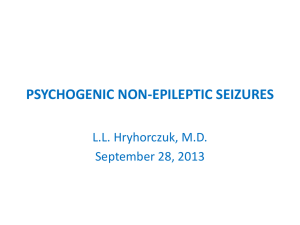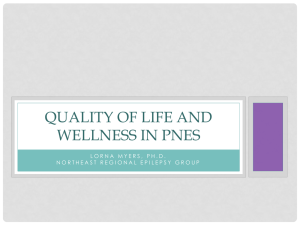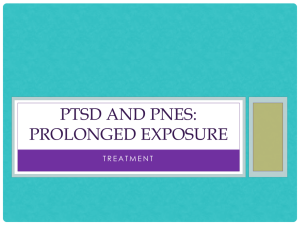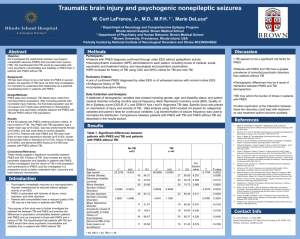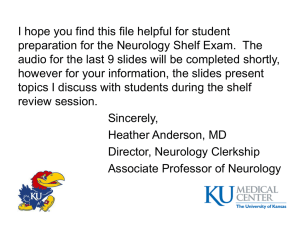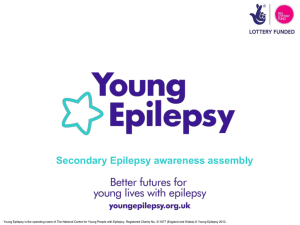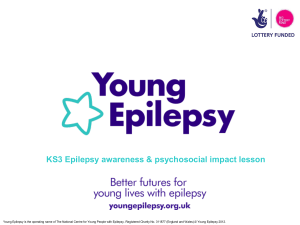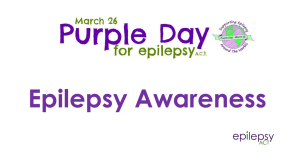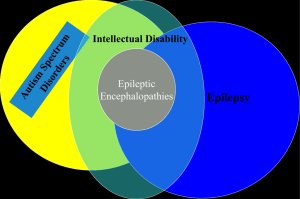Introduction to psychogenic non-epileptic seizures conference
advertisement
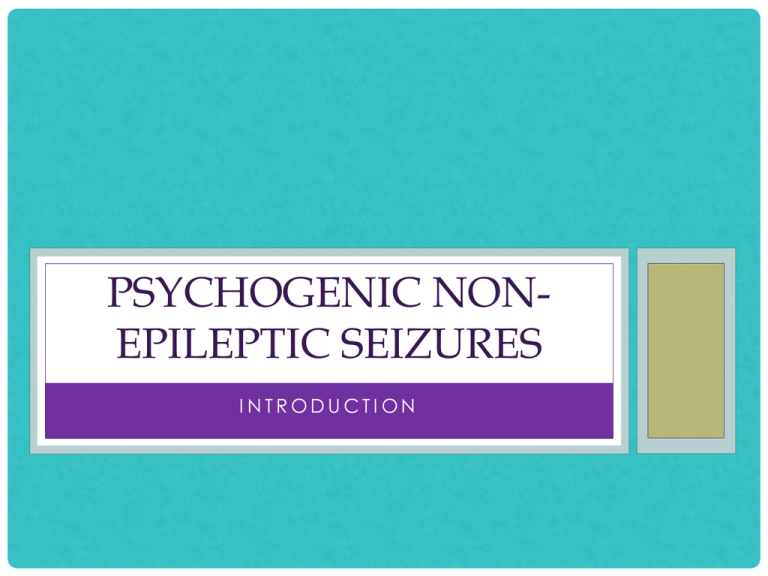
PSYCHOGENIC NONEPILEPTIC SEIZURES INTRODUCTION WELCOME! • First PNES/NEAD conference in the US • Historic Event that will hopefully become a tradition • And sow seeds growing a strong community and necessary projects • Create an alliance between dedicated health professionals and patient advocates NORTHEAST REGIONAL EPILEPSY GROUP • One of the few epilepsy centers in the US with a comprehensive PNES diagnosis and treatment program • 16 years old • 20 epileptologists, 4 neuropsychologists, 2 clinical psychologists, 1 social worker • Offices: 9 in NY (Staten Island, Manhattan, White Plains, Middletown, etc.), 9 in NJ (Hackensack, Summit, Jersey City, etc.) and 1 in CT. • Hospital-based epilepsy units: 7 in NJ and 8 in NJ EPILEPSY FREE FOUNDATION • First foundation to conspicuously identify PNES as a seizure disorder and to utilize its resources to support PNES • Psychogenic non-epileptic seizure disorders: A Guide: all royalties go to the EF Foundation to support these programs: • Continuing Education Scholarships for persons diagnosed with PNES • Support for educational programs for the general public and professionals • Support treatment research TODAY’S PROGRAM • 9:15-10 Understanding PNES through neuropsychological testing? Robert Trobliger, Ph.D • 10-10:45 How is PNES diagnosed through Video-EEG? Christos Lambrakis, MD • 10:45-11:00 Break • 11-11:45 Treating PNES through relaxation techniques, logs, and mindfulness-Urmi Vaidya, LCSW • 11:45-1pm LUNCH • 1-1:45 Treating patients with PNES who also carry a diagnosis of PTSD: Prolonged Exposure Therapy-Lorna Myers, Ph.D • 1:45-2:30 Quality of Life and Wellness in PNES-Lorna Myers, Ph.D. • 2:30-2:45 Break • 2:45-3:30 Caretakers-how can you be helped and how can you help?-Urmi Vaidya, LCSW • 3:30-4:00 Closing comments and questions TODAY’S PROGRAM • Once the formal meeting is over informal meeting from 4-5PM • PNES Community will meet and we can discuss future projects and where we are going from here. WHAT IS PNES? • Involuntary behavioral changes (movements of body parts, alteration of consciousness, loss of certain functions such as speech, etc.) that resemble epileptic seizures but do not demonstrate epileptiform activity during brain wave recording with an EEG. • They are typically triggered by emotion in one form or another and often psychological trauma is part of the patient’s history. IS THIS A RARE CONDITION? • Estimates of 2-33 out of every 100,000 people have PNES. • Up to 30% of patients seen on inpatient epilepsy monitoring units will be diagnosed with PNES. • PNES is about as prevalent as Multiple Sclerosis but receives much less exposure and is relatively unknown to the public. • PNES has been around for hundreds of years. 1800’s Freud and Charcot. • Around 10% have PNES and ES HOW IS IT DIAGNOSED? • PNESs can have countless presentations: paralysis, intense thrashing, stuttering, blinking, change in consciousness, etc. • Video-EEG monitoring is the Gold Standard for diagnosis. • Epilepsy Centers staffed by epilepsy specialists (aka epileptologists) offer this diagnosis. ARE THERE OTHER TESTS? • Neuropsychological testing (cognitive and psychological). • Psychiatric/psychological interview. • Possibly other diagnoses need to be ruled out -nonepileptic seizures (physiological) WHY MIGHT SOMEONE DEVELOP PNES? • History of trauma and possibly PTSD • Tendency toward dissociation under stress • Problems coping with stress (emotion and avoidance over task) • Alexithymia • Difficulties with anger management (assertiveness). Tendencies to hold emotions in and to detach from emotion. IS TREATMENT AVAILABLE? • Cognitive behavioral treatment: How you think and interpret an event affects how you feel about it and how you behave. • Prolonged exposure for PTSD: Avoidance of traumatic memories and associated reminders fuel the post-traumatic disorder. Treatment involves exposure/confrontation of the trauma and real behavioral changes. • Psychiatric medications • Chapter 2 LIVING WITH PNES • Quality of life • Safety issues • Practical issues (driving, working, studying, relationships) • What resources are there? • How about the caretakers? How can life be improved? RESOURCES AND CONTACT • Psychogenic Non-epileptic Seizures: A Guide available on Amazon • Website: www.nonepilepticseizures.com • Webinar on Psychogenic non-epileptic seizures on YouTube • Facebook: Psychological non epileptic seizures • Lmyers@epilepsygroup.com • www.epilepsyfree.com for continuing education scholarships and funds for educational programs
